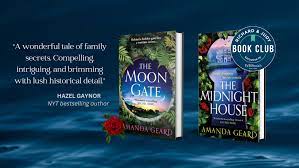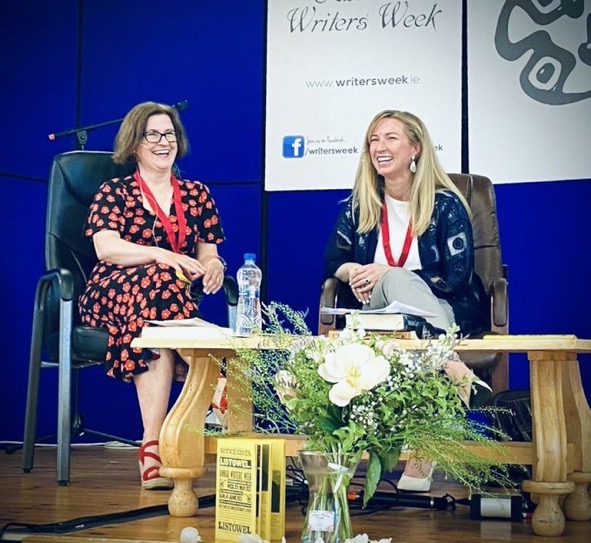Last month I wrote about how much fun it is to visit readers, as Mrs Hart continues her tour of any book group who’ll have her. This month I’m going to talk about collaboration with other writers. Not in the sense of writing together – I have very little experience of that beyond a Chalet School fanfiction collaboration with my friend Susanne. Not in the sense of supportive groups online, though that is a joy and an endless source of help, but in the very specific sense of getting together to do events.
Last week I was at Listowel Writers’ Week, Ireland’s oldest literary festival. The programmer, Stephen Connolly, told me I would be reading with another historical novelist, Tasmanian-born, County Kerry-dwelling Amanda Geard. We had never heard of each other. Our conversation was to be unmoderated so there was tremendous pressure on us to build a rapport. But what if I didn’t like her novel? What if I couldn’t find any points of contact between the books? And there was always the fear that she would hate Mrs Hart’s Marriage Bureau. Maybe she would be a very serious person who would despise a novel set in a marriage bureau? Her first novel, The Midnight House, had been a Richard and Judy pick. Maybe she would be too fancy and successful and I would look like an eejit beside her?
Amanda’s second novel, The Moon Gate, arrived in the post. It looked very beautiful and very big. Over 500 pages. Eek. And for a two-person discussion I would have to read every single one. I will never forget my very first literary panel, a reader’s day at a local library. We were talking about favourite books – a sort of Desert Island Books. I took it very seriously, spending weeks reading the other panellists’ choices, to ensure the best discussion for the audience. Three of the other panellists took the same approach. The fourth, who wrote for Mills and Boon, said that she hadn’t read any of the other books, because as a fulltime writer she didn’t have time to read. At the time I had published only a few stories and a lit crit book, but I knew that I was never, ever going to be that person.
Anyway – hooray! I loved The Moon Gate from the start. With three timelines, and moving between Tasmania, London and Kerry, it’s a sweeping, escapist epic story. Impressively potted, impeccably researched, it’s full of intrigue and heart. I gulped it down in a few days and I knew that I would like the person who wrote it. And even more of a hooray – the as-yet-unknown Amanda started to post on social media, and then to message me, about Mrs Hart. She loved it too! Even better, though the stories, settings and scope of the two novels were very different, we kept finding little things in common: a concern for the ongoing effects of war; the fascist menace in the 1930s; homesickness and loneliness.
Businesslike, we exchanged questions by email. We messaged all the week before the festival – OMG, I can’t believe she… I’m at the bit where… How could you have… I think I might know who…
The event was at two, and we agreed to meet at eleven in the hotel foyer. I sat with my notes, and her questions, nervous again that in three hours’ time an audience (hopefully!) would turn up to be entertained and informed by two authors who had never met. Amanda walked in bearing a box of eggs. ‘From our chooks,’ she said and I knew immediately that I had made a friend.
We talked and talked. We shared the anxieties we had each had about working with a stranger. We laughed at how silly that seemed now. And when two o’clock came round, and we were facing each other on stage, we settled into what already felt like a chat between old pals. Several of the audience told us later that they couldn’t believe we didn’t already know each other. We loved the chat, and the relationship between the two novels so much that, despite living 350 miles apart, we’ve already planned to pitch ourselves as a duo to other festivals. I can’t wait!
(And the eggs were delicious!)
Amanda and I were thrust together, as it were, by an insightful programmer. Later this week, on Saturday 17th June, I’m appearing at the Belfast Book Festival with Anne Booth. I haven’t met Anne in real life yet. I came across her first on this very blog, and when I read her gorgeous convent-set novel Small Miracles, I recognised in it the same sense of community, friendship and hope that’s central to Mrs Hart. Maybe, I suggested, she’d like to do some events together? I thought she might think I was pushy and crazy, but she was delighted. I pitched the idea of a discussion of ‘feelgood feminist fiction’ to Sophie Hayles, the director of the Belfast Book Festival, and luckily she agreed that it was a great idea. Our chat will be moderated by a fantastic writer and journalist, Sue Leonard, who has interviewed us both and whom I met years ago at the Tyrone Guthrie Centre, an artists’ retreat in County Monaghan.
Anne and I have zoomed, and I know already that we’re also going to have a great chat onstage! And we’re hoping to bring our feelgood feminist event to bookshops in the UK soon.
Writing can be lonely; publishing can be frustrating, but connecting with writers you admire is one of the things that makes this whole business worthwhile.












